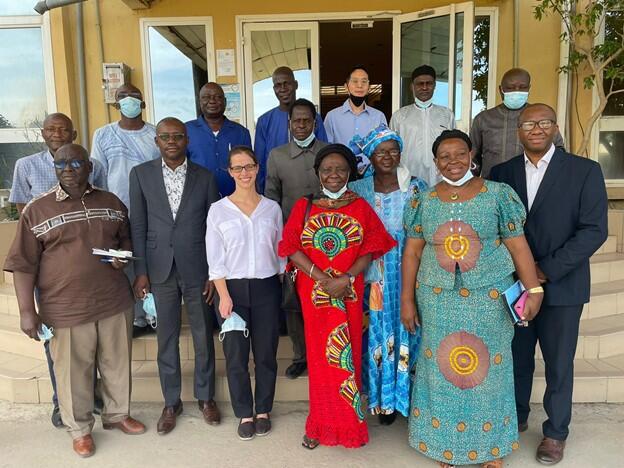
In mid-December 2021, a delegation from the Emergency Obstetric and Quality of Care Unit (EmOC&QoC) met with in-country partners in Chad and Togo to disseminate project results and discuss upcoming programme phases.
In Chad a conference was organised in collaboration with our implementation partners from the Centre de Support en Santé Internationale and the Centre de Recherche en Anthropologie et Sciences Humaines (CSSI-CRASH) consortium. Representatives from across the maternal and child health sector in Chad, including from the Ministry of Public Health and several health directorates, coordinators of national vertical programmes, united nation bodies, provincial and district health delegates, hospital directors, and master trainers were in attendance. Results from first two phases of the programme including preliminary research results from the stepped-wedge clinical trial and operational research study were presented to delegates by the programs in-country and international teams, as well as by national master trainers. The LSTM delegation was then invited to present their programme and research findings to top officials within the national Ministry of Health along with representatives from the World Health Organization and UNFPA on December 14th, 2021, which was well received.
Mrs Rolande Mindekem, in-country coordinator for the Chad program, expressed “It was heartening to see the engagement and appreciation of stakeholders during the dissemination workshop, as well as at the next day meeting in the room of his Excellency the Minister of Health and National Solidarity. Participants to the dissemination workshop were happy to extend the time to discuss more around all the results and we really wish to thank again all those who came to attend this event”.
In Togo, a programme dissemination meeting was also organised in collaboration with the Université de Lomé and the Ministry of Public Health and Hygiene and Access to Universal Care (MSHPAUS). The event was attended by representatives from across the maternal and child health sector. Constructive meetings with officials and leadership at the Université de Lomé, MSHPAUS, including the General Secretary, Directorates for Mother-Child Health and for Healthcare and Readaptation Facilities, National Malaria Programme, Country Coordinating Mechanism (CCM) and with the principal recipient of Global Fund subventions (Unité de Gestion de Projets - UGP) were realised. Several local health facilities were also visited allowing for productive discussions with frontline staff on the quality improvement programmes.
Pr. Guillaume Ketoh, focal point for the Togo program at UL, said “To fully play its role as a tool for the socio-economic development of Togo, UL has developed a policy for the creation of skills on targeted areas such as health and engineering. The project implemented by UL with the technical and financial support of the LSTM is part of this dynamic because it provides appropriate solutions to a noted weakness of the health system in Togo; it is the low quality of health care services according to international standards adapted to local realities. UL is therefore delighted with this partnership with LSTM, which has made it possible to meet the expectations of both UL and the beneficiary health facilities.”
Funded by the Global Fund to Fight AIDS, Tuberculosis and Malaria, we started to work in Togo in 2017 and in Chad in 2018. Our aim is to increase and improve the availability and quality of integrated ANC and PNC, including HIV, tuberculosis and malaria control in health facilities; to strengthen monitoring and evaluation (M&E) at facilities involved; improve maternal and newborn health through assessing maternal morbidity and neonatal morbidity; disseminate and communicate lessons learned and results via conferences, events and peer-reviewed publications.
"The dissemination workshops in Chad and Togo allowed us to share our results and discuss priorities as well as strategic targets in both countries. The Covid-19 pandemic has prevented us for the past year of any face-to-face interaction, and it felt very fulfilling to finally have this opportunity to reassert our close relationship with national partners in person” expressed Dr. Alexandre Quach, SRA, who coordinates the technical assistance to both programs in Liverpool.